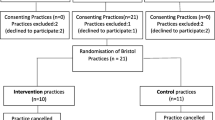Abstract
In order to improve educational programmes directed at health care workers we investigated their knowledge, attitudes and practices in relation to HIV/AIDS.
An anonymous self-administered questionnaires was distributed to 609 health care workers. Of these, 59.6% agreed to participate (42.4% of the medical doctors, 74.3% of the nurses and 79.6% of the laboratory technicians, health visitors and other health care workers).
All studied groups believed that their knowledge of HIV modes of transmission (84.3%) was sufficient. In contrast, a relatively small percentage reported knowledge of the clinical spectrum of HIV infection (48.8%) and the diagnostic assays (57.6%). Nearly all the study participants believe (92.8%) that there is a risk of acquiring HIV infection during the hospitalization of HIV/AIDS patients. Obligatory screening of all patients was reported by nearly all participants (90.6%) as a chance to minimize their occupational risk.
Although health care workers reported satisfactory knowledge of safety measures (87.0%), only 56.7% used gloves and 38.8% accept the hospitalization of HIV/AIDS patients.
In spite of the educational programmes for AIDS in Greece, this study demonstrates that health professionals' knowledge and precautionary measures are not sufficient. As a result, a small percentage of them treat AIDS patients without discrimination. There is an urgent need to implement specific educational programmes for health professionals so that they will safely provide high quality care to people affected by HIV/AIDS.
Similar content being viewed by others
Explore related subjects
Discover the latest articles and news from researchers in related subjects, suggested using machine learning.References
Anonymous (1987): The doctor's duty towards AIDS patients - Lancet 1274.
CockroftA. (1989): AIDS/HIV Counselling in Occupational Health - AIDS Care 1, 1: 97–103.
Doll R. (1987): A proposal for doing prevalence studies of AIDS - British Medical Journal 294–244.
Ezekiel J.E. (1988): Do physicians have an obligation to treat patients with AIDS? The New England Journal of Medicine 1686–1690.
GerberdingJ.L.et al. (1990): Risk of exposure of surgical personnel to patients' blood during surgery at San Francisco General Hospital - N. Engl. J. Med. 322: 1788–1793.
GillonR. (1987): Refusal to treat AIDS and HIV positive patients - British Medical Journal 294: 1332–1333.
HughesJ.M., GarnerJ.S.et al. (1988): AIDS epidemiological lessons from the health care setting -Journal of Hospital Infection 11 (Suppl. A): 209–217.
LewisC. and MontgomeryK. (1990): The HIV-Testing Policies of US Hospitals - JAMA 264: 2764–2767.
McEvoy M. and Porter K. (1987): AIDS and health care workers - Lancet, Jan 24.
PanlilioA.L.et al. (1991): Blood contacts during surgical procedures - JAMA 265: 1533–1535.
Papaevangelou H. (1988): AIDS and Human Rights in Greece. AIDS and Human Rights - The Danish Center of Human Rights, No. 6, 1988.
Searle E.S. (1987): Knowledge, attitudes and behaviour of health professionals in relation to AIDS- Lancet Jan 3.
ShansonD.C. (1988): Controversies about guidelines to prevent the transmission of human immunodeficiency virus in hospitals in Britain -Journal of Hospital Infection 11 (Suppl. A): 218–222.
Strine P., Martin L. and Mullan R.J. (1991): Occupational exposures in public safety workers - 7th International Conference on AIDS 16–21 June 1991 Florence, Italy.
Author information
Authors and Affiliations
Additional information
Corresponding author.
Rights and permissions
About this article
Cite this article
Roumeliotou, A., Kornarou, E., Papaevangelou, V. et al. Knowledge, attitudes and practices of Greek health professionals, in relation to AIDS. Eur J Epidemiol 8, 812–815 (1992). https://doi.org/10.1007/BF00145325
Issue Date:
DOI: https://doi.org/10.1007/BF00145325



